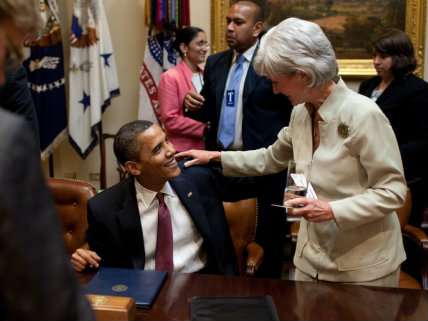Obama Administration Delays Obamacare's Employer Mandate, Again

Another day, another Obamacare delay. Once again, the employer mandate, which in theory requires businesses with 50 or more employees to provide qualifying health coverage for employees, is the target.
Las summer, the administration put the requirement on hold for an extra year. Now it's tweaking the provision even further. Businesses with between 50 and 99 employees will not be subject to the employer mandate until 2016. The administration says it will require employers participating in the delay to certify that they aren't cutting back on jobs strictly to fall under the 100-employee threshold.
The administration is also tweaking the coverage rules for larger businesses. Employers with 100 or more employees will now only have to provide coverage for 70 percent of their workers through 2016. Previously, those firms had been required to give coverage to 95 percent of their workers to meet the requirement.
Where does the White House get the authority to tweak and delay the rules like this? I'm not sure how much the administration actually cares at this point, but I suspect it derives at least partly from the—whoalookablimpbehindyougottarun!
To some extent this is just one of the many perils of attempting to make a law as complex and controversial as Obamacare work. The administration is attempting to please employers who don't like the requirement and mitigate some of the potential economic destabilization that could come with the requirement. It's a political move as much as anything. But it could further undermine the law's already shaky policy foundations. As Obamacare's supporters argued before the law was passed, the employer mandate is one of the key mechanisms the law relies on to keep costs down and coverage up. But the administration has now twice weakened that mechanism. (And at this point, you have to wonder if there aren't more tweaks to the provision coming down the line.)
At the same time, the administration's pick-and-choose approach to implementation has destabilized the law politically. Because the Obama administration won't be running the show forever. And future administrations, which might not be so sympathetic to the law or so tied to its fortunes, are likely to take advantage of the flexibility the Obama administration has made for itself here. Pascal-Emmanuel Gobry might be overstating the case a little bit when he writes at Forbes that President Obama is "giving conservatives all the tools they need to transform the country." But with legally dubious moves like this, the Obama administration is almost certainly setting a precedent that will eventually come back to haunt Democrats.


Show Comments (107)